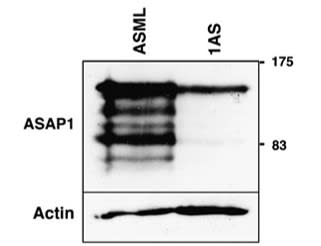Anti-ASAP1 [7B12]
Invented at Karlsruhe Institute of Technology
- Datasheet
- References (2)
- Inventor Info
Info
| Catalogue Number | 151767 |
| Applications | ELISA IHC IP WB |
| Antigen/Gene or Protein Targets | ASAP1 |
| Reactivity | Human and Rat |
| Relevance | ASAP1 possesses phosphatidylinositol 4,5-biphosphate-dependent GTPase-activating protein activity for ARF1 (ADP ribosylation factor 1) and ARF5 and a lesser activity towards ARF6. It may coordinate membrane trafficking with cell growth or actin cytoskeleton remodeling by binding to both SRC and PIP2. It potentially has involvement in tumour progression, having been shown to promote metastasis formation in vivo and stimulate tumor cell motility, invasiveness, and adhesiveness in vitro. ASAP1 represents a potential target for cancer therapy. |
| Host | Mouse |
| Immunogen | Recombinant Protein (fragment of human ASAP1 (corresponding nucleotides 977-1532 of KIAA1249) with N-terminal GST tag produced in E.coli strain BL-21) |
| Positive Control | Human: HT29 and MDA-MB-231 Rat: ASAP1 is strongly expressed in ASML and weakly expressed in 1AS pancreatic carcinoma cells. |
| Subclass | IgG2b |
| Myeloma Used | Sp2/0-Ag14 |
| Recommended Growing Conditions | 10% FCS + RPMI + Pen/Strep |
| Notes |
Other research areas applicable: Metastasis, cytoskeleton, vesicle trafficking. WB WB: Use a concentration of 1 µg/ml. Predicted molecular weight: 125 kDa. IHC-P IHC-P: Use a concentration of 5 µg/ml. IHC-Fr IHC-Fr: Use a concentration of 5 µg/ml. IP IP: Use a concentration of 10 µg/ml. ELISA ELISA: Use at an assay dependent concentration. |
| Research Area | Cancer, Cell Type or Organelle Marker, Cell Signaling & Signal Transduction |
References: 2 entries
Müller et al. 2010. Oncogene. 29(16):2393-403. PMID: 20154719.
WB IHC
ASAP1 promotes tumor cell motility and invasiveness, stimulates metastasis formation in vivo, and correlates with poor survival in colorectal cancer patients.
Europe PMC ID: 20154719
Add a reference
References: 2 entries
Müller et al. 2010. Oncogene. 29(16):2393-403. PMID: 20154719.
WB IHC
ASAP1 promotes tumor cell motility and invasiveness, stimulates metastasis formation in vivo, and correlates with poor survival in colorectal cancer patients.
Add a reference





![Image thumbnail for Anti-ASAP1 [7B12]](https://res.cloudinary.com/ximbio/image/upload/c_fit,fl_lossy,q_auto/c9ee26ef-11b6-4d39-8d15-c5a5dfa2fda1.jpg)
![Image thumbnail for Anti-ASAP1 [7B12]](https://res.cloudinary.com/ximbio/image/upload/c_fit,fl_lossy,q_auto/9c54dc6e-5dcb-4d3c-a778-eb52343eed6c.jpg)
![Image thumbnail for Anti-ASAP1 [7B12]](https://res.cloudinary.com/ximbio/image/upload/c_fit,fl_lossy,q_auto/004b3390-0565-4de9-ac2a-5cf460d310fc.jpg)
![Image thumbnail for Anti-ASAP1 [7B12]](https://res.cloudinary.com/ximbio/image/upload/c_fit,fl_lossy,h_45,q_auto/c9ee26ef-11b6-4d39-8d15-c5a5dfa2fda1.jpg)
![Image thumbnail for Anti-ASAP1 [7B12]](https://res.cloudinary.com/ximbio/image/upload/c_fit,fl_lossy,h_45,q_auto/9c54dc6e-5dcb-4d3c-a778-eb52343eed6c.jpg)
![Image thumbnail for Anti-ASAP1 [7B12]](https://res.cloudinary.com/ximbio/image/upload/c_fit,fl_lossy,h_45,q_auto/004b3390-0565-4de9-ac2a-5cf460d310fc.jpg)
